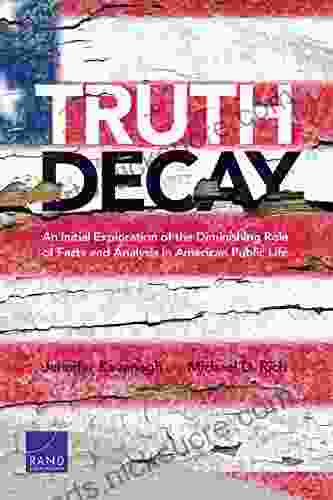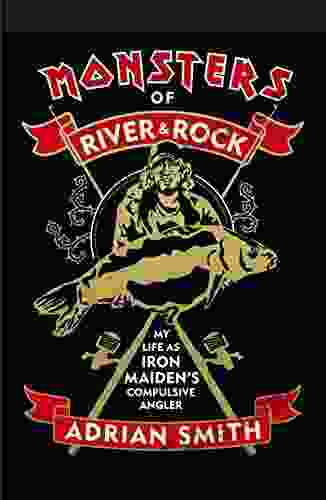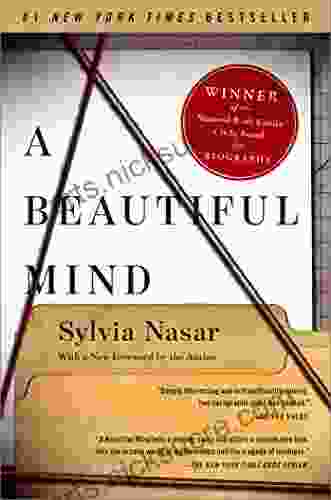Temporality in Qualitative Inquiry: Theories, Methods, and Practices

Temporality is a fundamental aspect of human experience. We are constantly experiencing time, whether we are conscious of it or not. Time shapes our thoughts, feelings, and actions. It structures our social interactions and institutions. It is an inescapable part of our lives.
4.2 out of 5
| Language | : | English |
| File size | : | 3764 KB |
| Text-to-Speech | : | Enabled |
| Enhanced typesetting | : | Enabled |
| Word Wise | : | Enabled |
| Print length | : | 214 pages |
| Screen Reader | : | Supported |
In qualitative research, temporality is an important consideration. Qualitative researchers seek to understand the world from the perspective of the people they study. This means that they need to be aware of the ways in which time influences the experiences and perspectives of their participants.
There are a number of different theories of temporality that can be used to inform qualitative research. These theories can be divided into two broad categories: linear and non-linear.
Linear theories of temporality
Linear theories of temporality view time as a linear progression from the past through the present to the future. This is the view of time that is most commonly held in Western culture. It is also the view of time that is most often used in quantitative research.
There are a number of advantages to using a linear theory of temporality in qualitative research. First, it is a simple and straightforward theory that is easy to understand. Second, it is a theory that is compatible with the methods of data collection and analysis that are commonly used in qualitative research.
However, there are also some disadvantages to using a linear theory of temporality in qualitative research. First, it can lead to a overly simplistic view of time. Time is not always a linear progression. It can also be cyclical, reversible, or even discontinuous. Second, a linear theory of temporality can lead to a focus on the past or the future at the expense of the present.
Non-linear theories of temporality
Non-linear theories of temporality view time as a more complex phenomenon than a linear progression. These theories recognize that time can be experienced in different ways by different people and that it can be shaped by social and cultural factors.
There are a number of different non-linear theories of temporality that can be used to inform qualitative research. These theories include:
- Cyclical theories of temporality view time as a cyclical process. This is the view of time that is most commonly held in many non-Western cultures. It is also the view of time that is most often used in qualitative research that is focused on cultural studies.
- Reversible theories of temporality view time as a reversible process. This is the view of time that is most often used in qualitative research that is focused on memory and narrative.
- Discontinuous theories of temporality view time as a discontinuous process. This is the view of time that is most often used in qualitative research that is focused on social change and transformation.
There are a number of advantages to using a non-linear theory of temporality in qualitative research. First, it can lead to a more nuanced and complex understanding of time. Second, it can help researchers to avoid the biases that can be associated with linear theories of temporality. Third, it can open up new possibilities for data collection and analysis.
However, there are also some disadvantages to using a non-linear theory of temporality in qualitative research. First, it can be more difficult to understand and apply than a linear theory of temporality. Second, it can lead to a more fragmented and disjointed understanding of the research data.
Methodological approaches to temporality in qualitative inquiry
There are a number of different methodological approaches that can be used to study temporality in qualitative inquiry. These approaches include:
- Narrative analysis is a method that can be used to analyze the ways in which people construct stories about their lives. These stories can reveal a great deal about the ways in which people experience and make sense of time.
- Discourse analysis is a method that can be used to analyze the ways in which people talk about time. This can reveal a great deal about the ways in which people think about time and how it shapes their social interactions.
- Grounded theory is a method that can be used to generate new theories about social phenomena. This method can be used to study the ways in which people experience and make sense of time.
- Ethnography is a method that can be used to study the everyday lives of people. This method can be used to observe the ways in which people interact with time and how it shapes their social interactions.
- Phenomenology is a method that can be used to study the subjective experiences of people. This method can be used to study the ways in which people experience and make sense of time.
- Autoethnography is a method that can be used to study the researcher's own experiences. This method can be used to study the ways in which the researcher's own experiences of time shape their research.
The choice of methodological approach will depend on the research question and the theoretical framework of the study.
Practical implications of temporality in qualitative inquiry
The concept of temporality has a number of practical implications for qualitative inquiry. These implications include:
- The importance of time in data collection. The researcher needs to be aware of the ways in which time can influence the data collection process. For example, the time of day, the day of the week, and the season of the year can all affect the ways in which people respond to interview questions.
- The importance of time in data analysis. The researcher needs to be aware of the ways in which time can influence the data analysis process. For example, the researcher's own experiences of time can shape the ways in which they interpret the data.
- The importance of time in reporting research findings. The researcher needs to be aware of the ways in which time can influence the reporting of research findings. For example, the researcher's own experiences of time can shape the ways in which they write about the research.
By being aware of the concept of temporality, qualitative researchers can conduct more rigorous and insightful studies.
Temporality is a fundamental aspect of human experience. It is a complex and multifaceted phenomenon that can be studied in a variety of ways. Qualitative researchers need to be aware of the concept of temporality and its implications for research design, data collection, data analysis, and reporting of research findings.
4.2 out of 5
| Language | : | English |
| File size | : | 3764 KB |
| Text-to-Speech | : | Enabled |
| Enhanced typesetting | : | Enabled |
| Word Wise | : | Enabled |
| Print length | : | 214 pages |
| Screen Reader | : | Supported |
Do you want to contribute by writing guest posts on this blog?
Please contact us and send us a resume of previous articles that you have written.
 Fiction
Fiction Non Fiction
Non Fiction Romance
Romance Mystery
Mystery Thriller
Thriller SciFi
SciFi Fantasy
Fantasy Horror
Horror Biography
Biography Selfhelp
Selfhelp Business
Business History
History Classics
Classics Poetry
Poetry Childrens
Childrens Young Adult
Young Adult Educational
Educational Cooking
Cooking Travel
Travel Lifestyle
Lifestyle Spirituality
Spirituality Health
Health Fitness
Fitness Technology
Technology Science
Science Arts
Arts Crafts
Crafts DIY
DIY Gardening
Gardening Petcare
Petcare Doki Cohen
Doki Cohen Adrian Li
Adrian Li Timothy D Wilson
Timothy D Wilson Amelia Simmons
Amelia Simmons Mildred Johnson
Mildred Johnson Paul Embrechts
Paul Embrechts Michael Mcteigue
Michael Mcteigue Zoe Clark Coates
Zoe Clark Coates Lily Luchesi
Lily Luchesi Aubre Tompkins Cnm
Aubre Tompkins Cnm Allie Duzett
Allie Duzett Adam Raider
Adam Raider Konstantinos Mylonas
Konstantinos Mylonas Mary Roach
Mary Roach Philip Gardiner
Philip Gardiner Karen J Bun
Karen J Bun Trevor Rowley
Trevor Rowley Elizabeth De Zulueta
Elizabeth De Zulueta Max Mason
Max Mason Jacqueline Winspear
Jacqueline Winspear Mona Liza Santos
Mona Liza Santos Adrian Wallwork
Adrian Wallwork Andrew Beyer
Andrew Beyer E Lockhart
E Lockhart Dr Paul Lam
Dr Paul Lam Gerry Lopez
Gerry Lopez Kosol Ouch
Kosol Ouch Nicole Bailey
Nicole Bailey C S Pacat
C S Pacat Adams Media
Adams Media Alondra Nelson
Alondra Nelson Dirk Baker
Dirk Baker Shawn Thornton
Shawn Thornton Alexi Pappas
Alexi Pappas Bobbie Ziemer
Bobbie Ziemer Adelheid A M Nicol
Adelheid A M Nicol Scott B Williams
Scott B Williams Danny Wuerffel
Danny Wuerffel Jenny Jones
Jenny Jones Cindy Nana Parente
Cindy Nana Parente Noah Michaud
Noah Michaud Kara Powell
Kara Powell Joe Varady
Joe Varady Gena Showalter
Gena Showalter Vedant J Maheshwari
Vedant J Maheshwari Bonnie Raingruber
Bonnie Raingruber Issendai Bechau
Issendai Bechau Veronica Strang
Veronica Strang Michele Angello
Michele Angello Jenna Parker
Jenna Parker Ken Robinson
Ken Robinson John Martin Taylor
John Martin Taylor Leigh Bardugo
Leigh Bardugo Malachi Martin
Malachi Martin Cameo Renae
Cameo Renae Joe Harkness
Joe Harkness David Blatner
David Blatner Eliane Kurbegov
Eliane Kurbegov Asrai Devin
Asrai Devin Thomas Pranio
Thomas Pranio Lucy Wolfe
Lucy Wolfe Joseph A Durlak
Joseph A Durlak Leslie T Chang
Leslie T Chang Kathy Toney
Kathy Toney Khalid Khashoggi
Khalid Khashoggi Shmuel Goldberg
Shmuel Goldberg Ayelet Fishbach
Ayelet Fishbach Dwayne Bryant
Dwayne Bryant Adele Jones
Adele Jones Ken Dehart
Ken Dehart Tom Ryan
Tom Ryan John Vaillant
John Vaillant Frank C Keil
Frank C Keil American Alpine Club
American Alpine Club Richard J Larsen
Richard J Larsen Robert Stone
Robert Stone Peggy Tharpe
Peggy Tharpe Gene Hill
Gene Hill Bruce Hood
Bruce Hood Liao Yiwu
Liao Yiwu Bridget Bishop
Bridget Bishop Daniel Sobieck
Daniel Sobieck Max Porter
Max Porter Ursula Goodenough
Ursula Goodenough Marc Roche
Marc Roche Robyn Wideman
Robyn Wideman Susan Rovezzi Carroll
Susan Rovezzi Carroll Natania Barron
Natania Barron Shelley Metten M S Ph D
Shelley Metten M S Ph D Wendy Heard
Wendy Heard Barry Brown
Barry Brown Louisa J Morgan
Louisa J Morgan Eric Orton
Eric Orton Taylor Markarian
Taylor Markarian Lakshya Trivedi
Lakshya Trivedi Adharanand Finn
Adharanand Finn Jo Deurbrouck
Jo Deurbrouck Jake Schafft
Jake Schafft Nancy Mellon
Nancy Mellon Helen Scheuerer
Helen Scheuerer Anita Bean
Anita Bean Team Golfwell
Team Golfwell Suzy Giordano
Suzy Giordano Kendare Blake
Kendare Blake Aftab Hamid
Aftab Hamid Kevin J Cheek
Kevin J Cheek Kenneth Martz
Kenneth Martz Zainab Yate
Zainab Yate Alexandra Christo
Alexandra Christo Seth Berkman
Seth Berkman Jane M Healy
Jane M Healy John Feinstein
John Feinstein Marissa Anderson
Marissa Anderson Timothy Gowers
Timothy Gowers Mary Ann Drummond
Mary Ann Drummond Melvin Konner
Melvin Konner Michael Brooks
Michael Brooks Joanne Jamrosz
Joanne Jamrosz Haym Kruglak
Haym Kruglak Robert C Renneberg
Robert C Renneberg Michael Kerrisk
Michael Kerrisk Robin L Rielly
Robin L Rielly Kirk Deeter
Kirk Deeter Tina L Quick
Tina L Quick Sergei Urban
Sergei Urban Ilene Skeen
Ilene Skeen Charles R Swindoll
Charles R Swindoll Harper Paris
Harper Paris C W Ceram
C W Ceram Frans X Plooij
Frans X Plooij Jay Mcgraw
Jay Mcgraw Meg Cox
Meg Cox Kamala Harris
Kamala Harris Joseph Pred
Joseph Pred Mickey Royal
Mickey Royal Adrian Wilson
Adrian Wilson Ae Marling
Ae Marling Dennis Cassinelli
Dennis Cassinelli Eric Hoffer
Eric Hoffer Douglas H Macdonald
Douglas H Macdonald David Churchman
David Churchman Gary Lonesborough
Gary Lonesborough Julia V Taylor
Julia V Taylor Joshua Baker
Joshua Baker Richard Ray
Richard Ray Adam Rutherford Phd
Adam Rutherford Phd James P Lewis
James P Lewis Doris J Barnes
Doris J Barnes Jasmine Taylor
Jasmine Taylor Agatha Christie
Agatha Christie Adam Woodbeck
Adam Woodbeck Balazs Csigi
Balazs Csigi George Yule
George Yule John Shelton Reed
John Shelton Reed Susannah Cahalan
Susannah Cahalan Adriana Rabinovich
Adriana Rabinovich Ken Jeremiah
Ken Jeremiah Boy Scouts Of America
Boy Scouts Of America Adrian Smith
Adrian Smith Sun Yung Shin
Sun Yung Shin Terrence W Deacon
Terrence W Deacon Lisa Mosconi
Lisa Mosconi Saidiya V Hartman
Saidiya V Hartman Ashley Bugge
Ashley Bugge John North
John North Peter L Bernstein
Peter L Bernstein Marie Colvin
Marie Colvin James B Marsh
James B Marsh Noson S Yanofsky
Noson S Yanofsky Heather D Yates
Heather D Yates Jeff Van West
Jeff Van West Terri Paajanen
Terri Paajanen James Goi Jr
James Goi Jr Timothy Leffel
Timothy Leffel Alexandra Horowitz
Alexandra Horowitz Craig Wiggers
Craig Wiggers Meganne Forbes
Meganne Forbes Heather Lende
Heather Lende Yusra Mardini
Yusra Mardini Adam Ploszaj
Adam Ploszaj Alisscia B
Alisscia B Heather Worthington
Heather Worthington Philip Maffetone
Philip Maffetone Wayne Curtis
Wayne Curtis Hans Reichenbach
Hans Reichenbach Lindsay Burton
Lindsay Burton Matt Morton
Matt Morton Kevin Biggar
Kevin Biggar Kevin Van Whye
Kevin Van Whye Kieran Higgins
Kieran Higgins Loren Cordain
Loren Cordain Simon Needham
Simon Needham Stephen John Peel
Stephen John Peel Tommy Caldwell
Tommy Caldwell Joe Posnanski
Joe Posnanski Warwick Rodwell
Warwick Rodwell Paul Parker
Paul Parker Adrienne Engleman Pga Fellow Professional
Adrienne Engleman Pga Fellow Professional David Mcraney
David Mcraney Jorge Luis Delgado
Jorge Luis Delgado Adele Faber
Adele Faber Ahmed Hulusi
Ahmed Hulusi Elias M Stein
Elias M Stein Darrell Huff
Darrell Huff Phil Cousineau
Phil Cousineau Agnieszka Latocha
Agnieszka Latocha Don Webb
Don Webb Nicole Spindler
Nicole Spindler Sarah Clarkson
Sarah Clarkson Susy Lee
Susy Lee Zhongwen Fu
Zhongwen Fu Karen Weekly
Karen Weekly Michael S Weisbach
Michael S Weisbach Pearl S Buck
Pearl S Buck Kate Wickers
Kate Wickers Marcus Heerdt
Marcus Heerdt Oscar Ratti
Oscar Ratti Brad Rock
Brad Rock John D Whidden
John D Whidden Frederick J Gravetter
Frederick J Gravetter Charles Dougherty
Charles Dougherty Peter Shirley
Peter Shirley Adrian Wells
Adrian Wells George Makari
George Makari Allen Hedrick
Allen Hedrick Brad Borkan
Brad Borkan Deborah Grace White
Deborah Grace White Dorothy Hamill
Dorothy Hamill Colin Pask
Colin Pask Tim Wise
Tim Wise Elizabeth Carman
Elizabeth Carman Joanna Warrington
Joanna Warrington Thomas E Gilson
Thomas E Gilson Jonathan Kozol
Jonathan Kozol Marty Ofonagoro
Marty Ofonagoro Sam L Savage
Sam L Savage Myatt Murphy
Myatt Murphy Barry Glassner
Barry Glassner William Smith
William Smith Luca Vargiu
Luca Vargiu Julie Mohan
Julie Mohan Jordan Bone
Jordan Bone Leckie
Leckie Libbi Palmer
Libbi Palmer Katarzyna Wac
Katarzyna Wac V C Andrews
V C Andrews Rick Sapp
Rick Sapp George A Morgan
George A Morgan The Times Mind Games
The Times Mind Games Maurice Isserman
Maurice Isserman Archie Brain
Archie Brain Walter Rhein
Walter Rhein Herbert Clyde Lewis
Herbert Clyde Lewis Agnes Light
Agnes Light James Lovelock
James Lovelock John Nero
John Nero Darron L Clark
Darron L Clark James C Dobson
James C Dobson Adiba Jaigirdar
Adiba Jaigirdar Afsaneh Moradian
Afsaneh Moradian Natalie Guenther
Natalie Guenther Barry Melrose
Barry Melrose Aditya Chatterjee
Aditya Chatterjee Jacqueline Houtman
Jacqueline Houtman Christina Shelley Albrecht
Christina Shelley Albrecht David Graeber
David Graeber Gary R Miller
Gary R Miller Herb Carnegie
Herb Carnegie Eric Adelson
Eric Adelson Lynne Kelly
Lynne Kelly Kirsten Watson
Kirsten Watson Rusty Richards
Rusty Richards Adam Serwer
Adam Serwer Master Sajid Ahmed
Master Sajid Ahmed Dan Fagin
Dan Fagin Philip Striano
Philip Striano Bruce Rosenfeld
Bruce Rosenfeld Cynthia A Robertson
Cynthia A Robertson Avner Ash
Avner Ash Gina Fava
Gina Fava Adrienne Mayor
Adrienne Mayor Rod Heckelman
Rod Heckelman Gianni Filippini
Gianni Filippini Baby Professor
Baby Professor Todd Whitaker
Todd Whitaker Andrea Huneeus Vergara
Andrea Huneeus Vergara Mark Bittman
Mark Bittman Basil Pickard
Basil Pickard Isabella Rotman
Isabella Rotman Annie Gilbert Coleman
Annie Gilbert Coleman Amy Racina
Amy Racina Chuck Mckeever
Chuck Mckeever Adam Stevenson
Adam Stevenson Adam Weymouth
Adam Weymouth Alex Aster
Alex Aster George Sheehan
George Sheehan Michelle Reid
Michelle Reid Valerie Melvin
Valerie Melvin Dagogo Altraide
Dagogo Altraide Ed Hanczaryk
Ed Hanczaryk Linus Wilson
Linus Wilson Bryan Willis
Bryan Willis Greg Guest
Greg Guest Amy Bartelloni
Amy Bartelloni Letitia Baldrige
Letitia Baldrige Rich Froning
Rich Froning Mayuri Saxena
Mayuri Saxena Carol Grbich
Carol Grbich Mihaly Csikszentmihalyi
Mihaly Csikszentmihalyi Adam Schupak
Adam Schupak Tessa Bielecki
Tessa Bielecki Barbara Mertz
Barbara Mertz Supana Onikage
Supana Onikage Collins Easy Learning
Collins Easy Learning Karl Sigmund
Karl Sigmund Ahmad Al Sukaini
Ahmad Al Sukaini Adam Pertman
Adam Pertman Alicia Young
Alicia Young Carl Johan Calleman
Carl Johan Calleman Harry Pearson
Harry Pearson David A Whitsett
David A Whitsett Steve Mchugh
Steve Mchugh Adrian Lobley
Adrian Lobley Afra J Zomorodian
Afra J Zomorodian Jess Thomson
Jess Thomson Nomi Prins
Nomi Prins Nastassja Martin
Nastassja Martin D J Conway
D J Conway Frank Delaney
Frank Delaney Lydia Kang
Lydia Kang Brian J Lang
Brian J Lang Rachel Ormston
Rachel Ormston Amy Blakeslee
Amy Blakeslee Staci Frenes
Staci Frenes Edgar Giffenig
Edgar Giffenig John D Mccann
John D Mccann Monique Boutsiv
Monique Boutsiv Erin Eileen Leigh
Erin Eileen Leigh Emily Larson
Emily Larson Afrodite Rossini
Afrodite Rossini Alex Tremm
Alex Tremm Robin Jones Gunn
Robin Jones Gunn Mariel Hemingway
Mariel Hemingway Ron Elbe
Ron Elbe Brittany Konsella
Brittany Konsella Paul Weamer
Paul Weamer Mark Cucuzzella
Mark Cucuzzella Bob Forsch
Bob Forsch Melanie Mitchell
Melanie Mitchell Sam Fadala
Sam Fadala Kathryn Casey
Kathryn Casey David Sloan Wilson
David Sloan Wilson Marta Alexander
Marta Alexander Martin Dorey
Martin Dorey Herbert L Roitblat
Herbert L Roitblat Elias Johnson
Elias Johnson Zachery Knowles
Zachery Knowles John Passmore
John Passmore Ademar Aguiar
Ademar Aguiar Amby Cooper
Amby Cooper Greg Wyshynski
Greg Wyshynski Dr James Dinicolantonio
Dr James Dinicolantonio Patrick Hutchinson
Patrick Hutchinson Meghan Mccarthy Mcphaul
Meghan Mccarthy Mcphaul Pete Jordan
Pete Jordan Adele Westbrook
Adele Westbrook Peter Wayne
Peter Wayne Gary Dean Quesenberry
Gary Dean Quesenberry Charles D Amico
Charles D Amico John Hillman
John Hillman Fergus Connolly
Fergus Connolly Timothy Malcolm
Timothy Malcolm Jose Antonio Fernandez
Jose Antonio Fernandez Melinda Folse
Melinda Folse Susan Garcia
Susan Garcia Adrienne Rawlinson
Adrienne Rawlinson Jennifer Justus
Jennifer Justus Christina Cimorelli
Christina Cimorelli Kim Gosselin
Kim Gosselin Angel Millar
Angel Millar James Mcdougall
James Mcdougall P Brian Noble
P Brian Noble Bettina Elias Siegel
Bettina Elias Siegel Scott O Dell
Scott O Dell Andres Mooring
Andres Mooring Stephen Brennan
Stephen Brennan Nelson L Schuman
Nelson L Schuman Heidi Dusek
Heidi Dusek Nicholas Kardaras
Nicholas Kardaras Mick Dolan
Mick Dolan Elizabeth Parker
Elizabeth Parker Larry Clay
Larry Clay Johnathon Allen
Johnathon Allen Kevin Greene
Kevin Greene Mel Levine
Mel Levine Lori Bregman
Lori Bregman John Graves
John Graves Nicholas Carr
Nicholas Carr Duffy Gaver
Duffy Gaver S Yates
S Yates Brian K Jones
Brian K Jones Gerry Giovinco
Gerry Giovinco Susan Adams
Susan Adams Jason Browne
Jason Browne John Muir
John Muir Spike Walker
Spike Walker Moon Ho Jung
Moon Ho Jung Jack Heinowitz
Jack Heinowitz Hannes Wessels
Hannes Wessels Ben Marcus
Ben Marcus Michael Bronski
Michael Bronski Seymour Lipschutz
Seymour Lipschutz Andrea Ros
Andrea Ros Gregory Curtis
Gregory Curtis Trisha Yearwood
Trisha Yearwood J Lynn Bailey
J Lynn Bailey Akilah Hughes
Akilah Hughes Daniel Kahneman
Daniel Kahneman Paul L Wachtel
Paul L Wachtel Sarah Stillman
Sarah Stillman Timothy J Baroni
Timothy J Baroni Joseph Bruchac
Joseph Bruchac Michael H Lubetsky
Michael H Lubetsky Thich Nhat Hanh
Thich Nhat Hanh Dale F Bloom
Dale F Bloom Adrian May
Adrian May Joan Naidorf
Joan Naidorf Adib Khorram
Adib Khorram Adam Shoalts
Adam Shoalts Jeff Wiltse
Jeff Wiltse Kathy A Zahler
Kathy A Zahler Michael J Domitrz
Michael J Domitrz Adrian Gonzales
Adrian Gonzales C K Murray
C K Murray Normandi Ellis
Normandi Ellis Jeff Hutton
Jeff Hutton Adrian Bardon
Adrian Bardon Helen Xander
Helen Xander Rebecca Lowe
Rebecca Lowe Tim Hodkinson
Tim Hodkinson Adam Shaw
Adam Shaw Claire Heffron
Claire Heffron Don Nehlen
Don Nehlen Jeff Wallach
Jeff Wallach Slavka Bodic
Slavka Bodic Debra D Sullivan
Debra D Sullivan Robin Suerig Holleran
Robin Suerig Holleran M Barlow Pepin
M Barlow Pepin Peter Marshall
Peter Marshall Adrienne Tooley
Adrienne Tooley Fred Luskin
Fred Luskin Laura Fuentes
Laura Fuentes Adrienne Young
Adrienne Young Yuu Tanaka
Yuu Tanaka Laura Zinn Fromm
Laura Zinn Fromm Aenghus Chisholme
Aenghus Chisholme Michael D Rich
Michael D Rich Shami Stovall
Shami Stovall Sylvia Nasar
Sylvia Nasar Si Robertson
Si Robertson Jd Richey
Jd Richey Christopher Pike
Christopher Pike Emily Ross
Emily Ross Julie Gore
Julie Gore Tony Grice
Tony Grice Alvin E Roth
Alvin E Roth Sherrie Nist Olejnik
Sherrie Nist Olejnik Anita Shreve
Anita Shreve Tony Herman
Tony Herman Amy Kovarick
Amy Kovarick Ari Marmell
Ari Marmell Renato Rosaldo
Renato Rosaldo Marta Szabo
Marta Szabo Mark Matlock
Mark Matlock Mike Jacker
Mike Jacker Christy Isbell
Christy Isbell Carmen Juncal
Carmen Juncal Alvin Boyd Kuhn
Alvin Boyd Kuhn Suzanne Swedo
Suzanne Swedo Adrian Bejan
Adrian Bejan Max Jammer
Max Jammer Stephen Tignor
Stephen Tignor
Light bulbAdvertise smarter! Our strategic ad space ensures maximum exposure. Reserve your spot today!
 Theodore MitchellFollow ·14.1k
Theodore MitchellFollow ·14.1k Alec HayesFollow ·12.1k
Alec HayesFollow ·12.1k Mike HayesFollow ·10.1k
Mike HayesFollow ·10.1k Heath PowellFollow ·13.8k
Heath PowellFollow ·13.8k Jacob FosterFollow ·17.9k
Jacob FosterFollow ·17.9k Danny SimmonsFollow ·7.3k
Danny SimmonsFollow ·7.3k Lord ByronFollow ·16.2k
Lord ByronFollow ·16.2k Oscar BellFollow ·3.7k
Oscar BellFollow ·3.7k
 Cruz Simmons
Cruz SimmonsThe Ultimate Canadian Cookbook: A Culinary Exploration of...
Journey into the heart of Canadian cuisine...

 Grayson Bell
Grayson BellAn Initial Exploration Of The Diminishing Role Of Facts...
When we think of the digital age, we often...

 Jayden Cox
Jayden CoxHollywood Trainer's Real Guide to Getting the Body You've...
Achieving a fit and...

 Octavio Paz
Octavio PazGood Walk Spoiled: An Exploration of the Effects of...
Dogs are often hailed...

 Jerome Powell
Jerome PowellMuhammad Allah Ahmed Hulusi: A Visionary Scholar and...
Muhammad Allah Ahmed Hulusi...
4.2 out of 5
| Language | : | English |
| File size | : | 3764 KB |
| Text-to-Speech | : | Enabled |
| Enhanced typesetting | : | Enabled |
| Word Wise | : | Enabled |
| Print length | : | 214 pages |
| Screen Reader | : | Supported |














